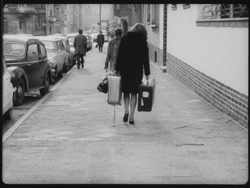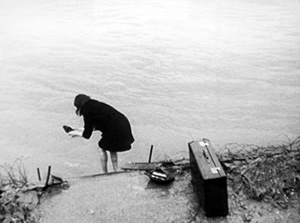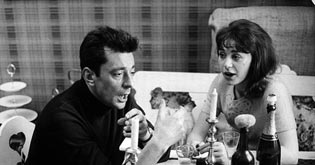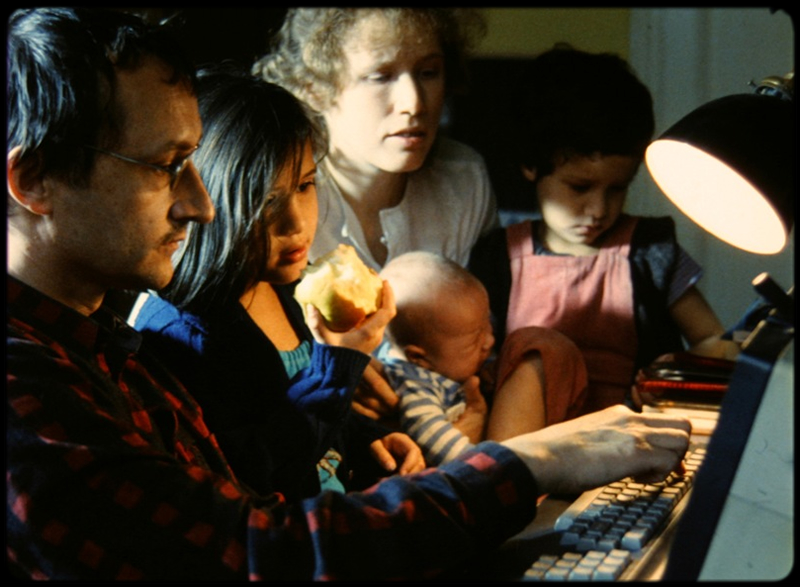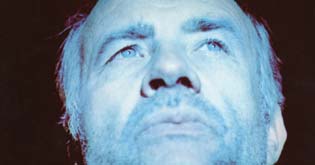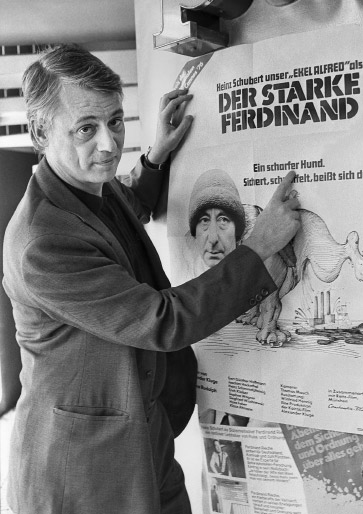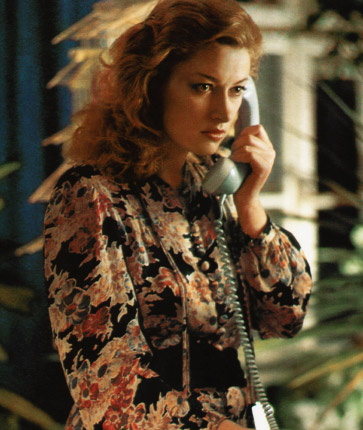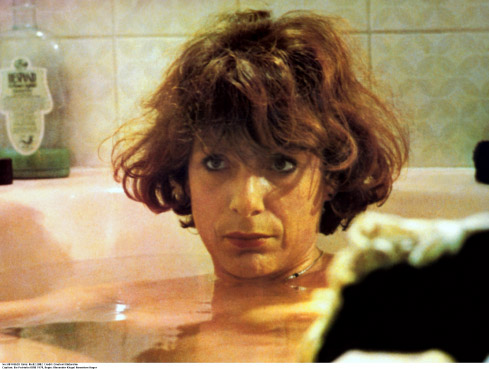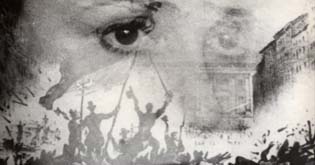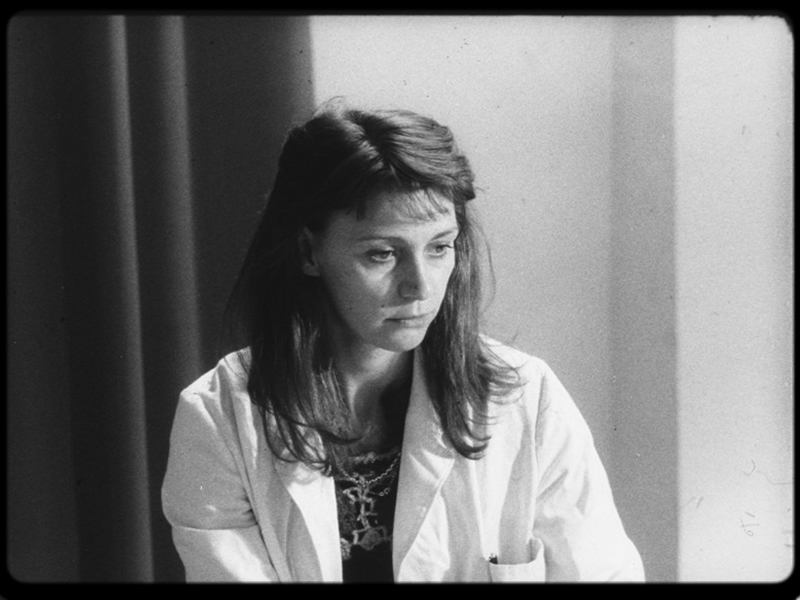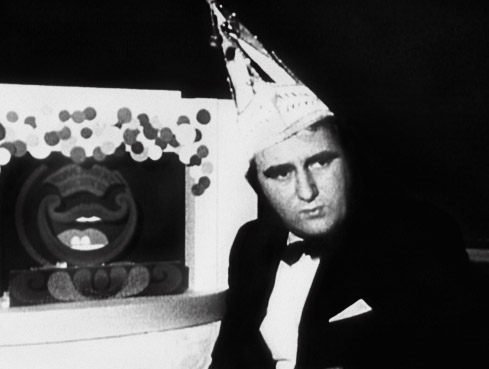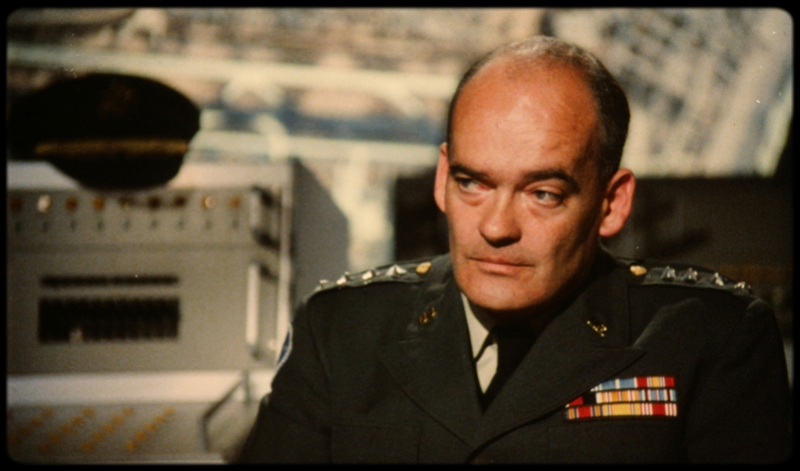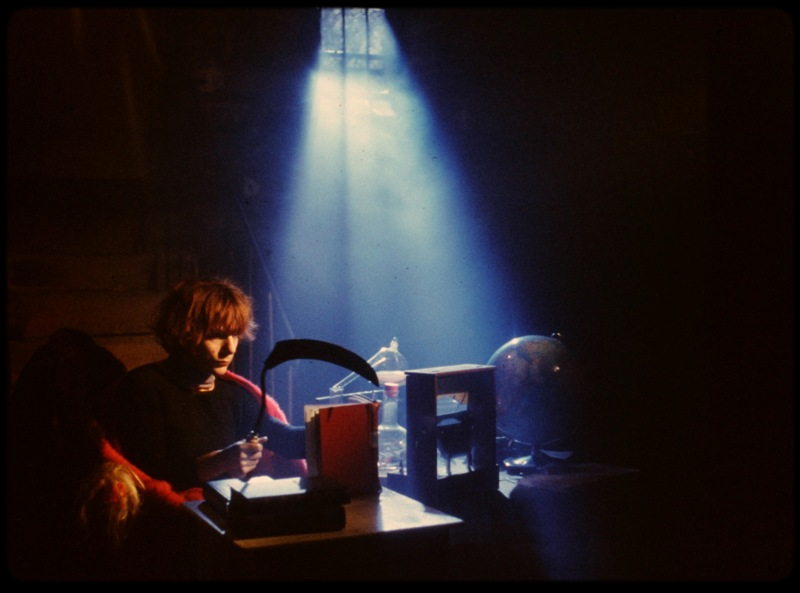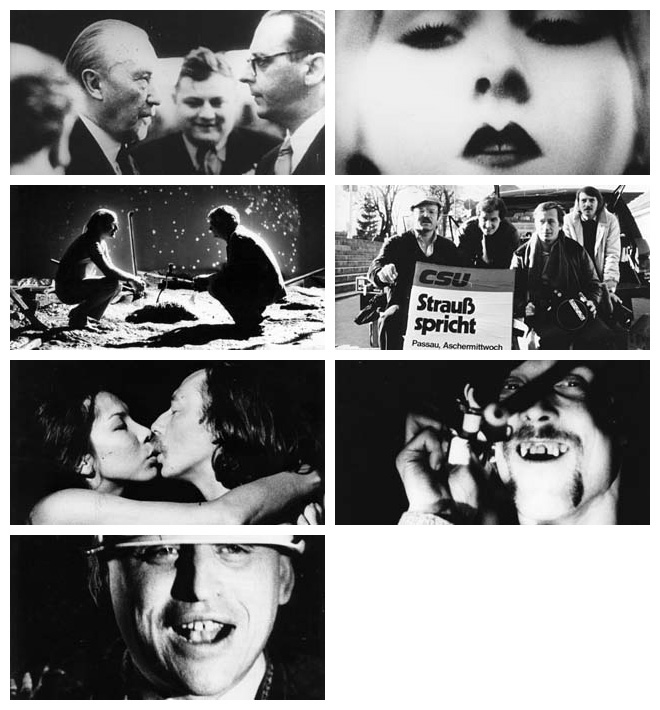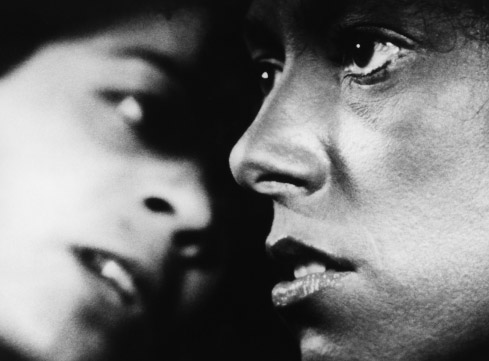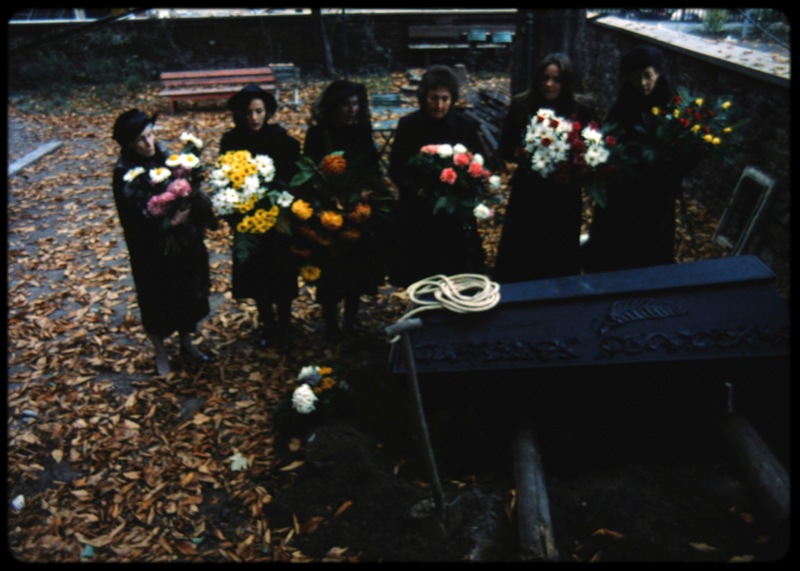Part of Fall 2008 - A Lower World
Tickets at the door or for advance purchase contact info @bulgergallery.com
or call 416-504 -0575 Admission 18 yrs+
As one of Germany’s most influential and revolutionary filmmakers, philosophers and authors, Alexander Kluge, who had close ties to Theodor Adorno and the Frankfurt School, was one of the principal architects of a movement that led to what we have come to know as New German Cinema. As co-signatory of the famous Oberhausen Manifesto (1962), which sought freedom from the established conventions of filmmaking, Kluge helped critically redefine the aesthetic, thematic and economic concepts of modern independent cinema. While addressing essential formal and political concerns of the 60s, 70s and early 80s in Germany, Kluge’s feature films carry with them thematic and stylistic resonances that clearly speak to us to this day.
All films presented on video in German with English subtitles.
Programmes:
Tues, Oct 28, 7pm (double-feature evening)
Part-Time Work of a Domestic Slave, 1973, 87 min.
Roswitha Bronski runs an illegal abortion practice so that she can afford to have more children. For Kluge, her actions epitomize the contradictions and selfishness of contemporary society and especially of its basic unit, the family. The film recounts Roswitha’s commendable, if often misguided, efforts to change her life and the society in which she lives. When her practice is closed by the police, she becomes a political activist. Her attempts to raise the consciousness of local newspapers fails as do her efforts to encourage militancy among the workers at the factory where her husband works as a chemist. He is fired, but Roswitha continues to campaign by selling sausages wrapped in political pamphlets. Like Anita G. and Leni Peickert, Roswitha must navigate a difficult path through existing conditions in the Federal Republic of the day. Unlike them, she is neither a victim nor a utopian reformer, but a dreamer committed to practical action. As such, she is in many respects the most resourceful and sympathetic of Kluge’s heroines, a kind of “Mother Courage” played out in a minor key. She has not been perceived this way, however, by feminist critics of the film. They objected – with considerable justice – to what they regarded as Kluge’s condescending treatment of Roswitha (once again played by his sister Alexandra), particularly to his frequent mocking voiceovers. (The controversy provoked Kluge to develop his theory of “antagonistic realism” in discursive terms as a response to their objections.)
+
Tues, Oct 28, 9pm
In Danger and Deep Distress the Middle Way Spells Certain Death, 1974, 90 min.
Kluge has often acknowledged the many ways his films are stylistically indebted to the silent cinema. With In Danger he revives the tradition of the “city symphony” from the 1920s to construct a disquieting portrait of contemporary Frankfurt as an ominous antcipation of Germany’s urban future. Kluge and his co-director Edgar Reitz won the Bundesfilmpreis for this extraordinary feature which interweaves fictional and documentary sequences to create a unique hybrid. The “real” events are mediated by Rita Müller-Eisert, a lyrical spy in the service of the former GDR, and Inge Maier, a prostitute and thief. Like many Kluge characters, they are not rounded and three-dimensional, but rather allegorical figures that animate the film. They promenade through a series of unstaged events – the Fasching carnival, a meeting of young entrepreneurs, a convention of astrophysicists, and, most spectacularly, the demonstrations and street fights following the evictions of squatters from Frankfurt’s old West End homes to make way for commercial skyscrapers – and thereby they help to subvert the established boundry between the feature and the documentary film genre. An astonishing sound and music montage, always a distinctive feature of Kluge’s films, mixed portentous Wagner orchestral interludes, bouncy tangos, La Triviata excerpts, sentimental “evergreen “ melodies, several different voiceovers and live sound to create a polyphonic contrast to the grainy, “authentic,” black and white images of everyday life in the Federal Republic’s most modern city of the 1970s.
Wed, Oct 29, 7pm (double-feature evening)
Strongman Ferdinand, 1975/96, 97 min.
After 1973, Kluge’s theoretical writing about contemporary society stressed the emergence of potentially dangerous new social spheres controlled by business and industry which exist outside public scrunity. In Strong Man Ferdinand, he explores one such space through the tragicomic story of Ferdinand Rieche, an ex-policeman who dreams of becoming a CIA operative. Rieche is hired as the security director of an industrial plant. Fanatically devoted to order, if not the law, he zealously constructs a command post inside the factory, organizes a paramilitary force, conducts combat exercises, stages raids in his own facility, and detains employees suspected of contacts with competitors. Dogged surveillance of company officers eventually leads him to uncover a plan to sell the business and to arrest a director for “treason‘. Fired, Rieche attempts to assassinate a government minister to demostrate how necessary security officers are. Perhaps more than any other of Kluge’s films, Strongman Ferdinand tries to reconcile theoretical observations with mass appeal. The film is Kluge’s most accessible. The narrative is handled more conventionally than is customary in Kluge’s work, and no radical formal innovations are attempted. But the character of Rieche, as performed by popular television star Heinz Schubert, is both poignant and chilling. He is a notable addition to the portrait gallery of utopian dreamers who populate Kluge’s cinema.
+
Wed, Oct 29, 9pm
Germany in Autumn, 1978, 119 min.
The kidnapping of Mercedes-Benz executive Hans-Martin Schleyer, the hijacking and rescue of a Lufthansa airliner, the suspicious deaths of the leaders of the Baader-Meinhof gang in Germany’s highest security prison, and the threat of government crackdowns against left-wing intellectuals during the fall of 1977 are the political background to this important collective work. Many politically concerned filmmakers, including Kluge, Fassbinder and Schlöndorff, resolved to make a film, necessarily without government subsidy, exploring any of the ramifications of the events excluded from government and right-wing controlled news coverage. Quickly shot by several teams working independently without a comprehensive plan, the film’s final form was primarily determined by Kluge and his long-time editor, Beate Mainka-Jellinghaus. They synthesized newsreels from Germany’s Nazi past, quotations from a television production of Antigone, popular illustrations, mock 1920s agit-pop films, and fictional sketches reflecting the pervasive mood of paranoia with documentary footage from Schleyer’s and the terrorists’ funerals to create a collage unified by many subtle thematic and visual echoes. Their purpose was not to provide a propagandistic political analysis , but rather to open striking historical as well as emotional perspectives and connections between current events of that day in order to help German spectators work through an exceptionally difficult national crisis.
Tues, Nov 4, 7pm
The Female Patriot, 1979, 121 min.
Gabi Teichert, a history teacher in Hessen as well as an amateur archeologist and alchemist, has a problem. German history, is not “positive enough” and cannot be taught in a patriotic version. Germany’s history has also, for example, caused difficulties for the shattered remains of the late Corporal Wieland now in a bunker near Stalingrad. By introducing eccentric mediating figures and stories at the very beginning of his film, Kluge signals the film’s theme: a meditation about the possibility of a history of Germany from the bottom up, one that records the singularity of events and avoids the idealizing, falsely totalizing perspective of histories written “from above.” Gabi Teichert’s investigations transform contemporary Germany into an archeological site whose ruins are sifted in search of the marginal, the idiosyncratic, the forgotten and the repressed. Familiar continuities – fairy tales, educational policies, political conventions – are gradually dissolved. The fissured text of Die Patriotin itself becomes a construction site – one of Kluge’s favorite metaphors – on which spectators are provocatively invited to build their own counter-histories.
Wed, Nov 5, 7pm
War and Peace, 1982/83, 118 min.
The German government’s decision to install American Pershing II and Cruise missiles in 1982 provoked widespread protests in the Federal Republic. Kluge again joined with several colleagues to make a third collective film (after Germany in Autumn and The Candidate) charting the course of demonstrations and exploring the implications of living on the edge of total annihilation. As in his other films, Kluge mixes cinematic modes to assemble an extraordinarily diverse, often incisive, at times heavy handed, sometimes maddeningly oblique range of perspectives on the issues. Schlöndorff contributes a sequence in which President Reagan and other Western leaders fly to Versailles for a summit meeting. A red carpet is ceremoniously rolled out as each arrives. Fountains are turned on as the helicopters touch down, and turned off immediately after they depart. No words are needed to underscore the disturbing point that such meetings are spectacles for public consumption, not occasions for serious deliberations. The inventor of the neutron bomb tells an interviewer that his children regard his invention “with tremendous indifference.” Excerpts from a CBS documentary on Hattenbach, a small West German border town, which also happened to be known as ground zero in NATO’s strategic plan, are accompanied by Jello and beer commercials that lend a sense of normalcy to the lunatic prospect of nuclear war. To these chilling documents Kluge adds sequences from old films and paintings that underscore the delusions of military conquest and highlight the primeval aggressive drives that continue to fuel them.
Tue, Nov 11, 7pm (double-feature evening)
The Candidate, 1982, 118 min.
The concept of the “Autoren-film,“ of films produced and directed by an individual to express his or her vision of the world, dominated thinking about cinema during the first fifteen years of New German Cinema. The political crisis of the late sixties and early seventies, however, revealed what Kluge called the “infantile disorders” of this idea: the filmmaker’s isolation both from a mass public and his colleagues. As a remedy, Kluge expounded the notion of “the cooperative film,” a pooling of resources and ideas which would enable filmmakers, relatively powerless when working alone, to communicate more promptly and effectively about political and social issues. Germany in Autumn became the first successful venture of this sort. Der Kandidat, a group effort by some of the contributors to the earlier film, was explicitely conceived as a political exposé on Franz Joseph Strauss, ex-Defense Minister, ex-Interior Minister, and reigning Minister-President of Bavaria who was running for the Federal Chancellorship in 1980. Stefan Aust used old newsreels to underscore the many follies of Strauss’s career, including the notorious “Spiegel Affair” of 1962 in which Strauss illegally authorized a raid of the liberal weekly’s editorial offices. Home movies, contemporary interviews and sophisticated journalistic reports on Strauss’s political rallies are synthezised to create a multifaceted assessment of a candidate the filmmakers regard with considerable anxiety. No firm conclusions are drawn, but acute questions about Strauss’s fitness to lead the nation are raised and may have contributed to his electoral defeat.
+
Tue, Nov 11, 9 pm
The Power of Emotions, 1983, 112 min.
For Kluge, Hollywood cinema, like nineteenth-century opera, is a “power-house of emotions” that produces tragic results. According to Kluge, our feelings, which are infallible and “always believe in a happy end,” are deceived by Hollywood’s illusory images and the streamlined logic of its plots that seduce our vision into the service of technocratic (un)reason. “Die Macht der Gefühle“ ruminates on these notions and on ways the undeniable power of emotions can be redeemed through and for cinema. In more than two dozen episodes and sequences, the perceptual and conceptual underpinnings of opera and the movies are subverted. Technical devices such as fast-motion or colorization contest the authority of “realistic” images of the world. Impossible stories – a murdered Yugoslav factory manager is miraculously brought back to life by two petty criminals – defy all ordinary dramatic logic. Stage tricks are unmasked and one of the most poignant moments in opera – the mistaken killing of Rigoletto’s daughter – is coolly analyzed by a wardrobe mistress. On the other hand, the film develops a web of references and allusions even more mysterious and hard to grasp than is usually the case in Kluge’s films. The radical openness of its structure stimulates the spectaors to discriminate between feelings, make intuitive distinctions, and trace emotional as well as rational connections in order to compose “the films in their heads” which Kluge regards as the necessary path to cinematic enlightenment.
Wed, Nov 12, 7 pm (double-feature evening)
The Blind Director, 1985, 106 min.
The literal translation of the title of Kluge’s twenty-eighth film – “The Assault of the Present on the Rest of Time” – summarizes a concern animating his practice since the beginning. Kluge fears that our experience of time, our ability to remember and to imagine the future, is being liquidated – or scrapped, to use one of his favourite metaphors – by a society fixated on immediate demands and gratification established by mass media, by the “consciousness industry.” The dispersed narrative focus and atomized imagery of Kluge’s literature and cinema are attempts to counter this flattening of temporal experience by providing audiences with complex, multifaceted time constructions that simultaneously offer therapy and training. “The Blind Director” explicitly thematizes this issue. An anthology of vignettes portrays emblematic contemporary characters entirely consumed by their present work: rushing business executives, calculating foster mothers, and obsessive computer programmers. The last story, about a director who goes blind during the filming of his sixty-third feature but continues to shoot his film anyway, ironically poses an alternative. The director can only “see” things from the past, but these memories and imaginings are so vivid and satisfying that he happily survives his loss of the immediately perceptible world. The figure of the director is a sly composite portrait of Kluge himself superimposed onto that of his friend and mentor, the philosopher Theodor Adorno, who used to mock the cinema by saying that he loved to go to the movies, however, the only thing that bothered him were the images on the screen.
+
Wed, Nov 12, 9 pm
Serpentine Gallery, 1995-2005, 100 min.
“Serpentine Gallery Program” (1995-2005), a series of short films by the influential German filmmaker Alexander Kluge, demonstrates his aesthetic achievements in new and exciting ways. Of particular interest are his unique modes of experimental image composition and daring reinterpretations of his longer films. This series, which was first screened as individual shorts on television, was shown for the first time in its entirety in 2006 in an exhibition pavilion in London’s Hyde Park. Each of these miniature stories reveals its inner self not only on its own, but most remarkably in relation to the other pieces in the series.
- Minute Films | Advertisement collections televised on SVT (1998)
- Cold Death Interrupts Love | Televised on RTL (May 29, 1995)
- He Who Hopes, Dies Singing | Televised on RTL (March 14, 1999)
- The Flexible Entrepreneur | Televised on RTL (February 18, 2001)
- A Woman Like a Volcano | Televised on RTL (October 6, 2003)
- The Officer as a Philosopher | Televised on RTL (January 24, 2005)
